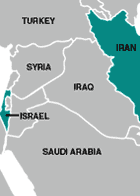Iran

Iran's nuclear program marches on: an existential threat to Israel—target of Tehran's declared genocidal intent—and an immense strategic challenge to the United States and the West as well as to Muslims, Arabs, and others with a stake in geopolitical stability. The Iranian regime has made no bones about seeing this moment as an historical hinge, marked by the rout of American influence and the rise of Tehran as the region's dominant power. As Mahmoud Ahmadinejad proclaimed last week at his meeting in Damascus with the complaisant Bashar al-Assad, Hassan Nasrallah, and Khaled Mashal, the Americans "have reached a dead end. They once wished to rule over the entire Middle East. Now, they . . . are leaving their reputation, image, and power behind in order to escape."
As Western options visibly narrow, the fault lines of Western resolve are increasingly evident. Internal disagreements abound on the precise nature of the Tehran regime and the need to contain its ambitions. The failure to form a united front against the ayatollahs is explained by reference to today's neo-mercantile global order: not only Russia and China but even key Western European democracies may make common cause with the U.S. on some issues but are uncooperative or confrontational on others, in no obvious pattern save for the imperatives of national interest and ad-hoc advantage.
Within Iran itself, by contrast, there is the extraordinarily heartening emergence of the Green movement. In the short term, the effort to crush it has strengthened the hand of the vicious Revolutionary Guards. In the long or (some say) medium term, the opposition could yet gain mass momentum, and with it would grow exponentially the hopes for a better Iran. To be sure, the opposition comprises anti- or non-democratic elements as well as democratic ones, and in any case there is no guarantee that it can prevail soon enough to make a difference. But this merely underlines the pressing imperative of the moment, which is that the current regime must be confronted.
With Washington still bent on avoiding confrontation, however, and still fastidiously refraining from offering even rhetorical support to the opposition, the safer bet is that Iran's rulers will continue to feel emboldened. For Israel—not Tehran's sole or perhaps even its major target, yet certainly its nearest—there could soon be, barring a miraculous turn of events, few if any choices left at all.
Comments are closed for this article.




